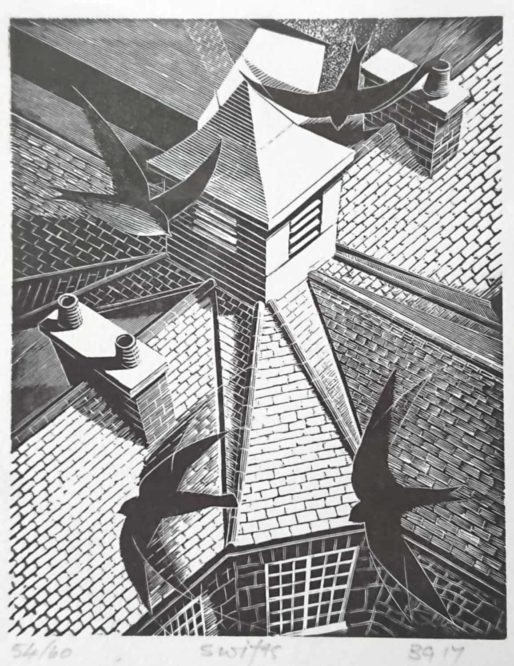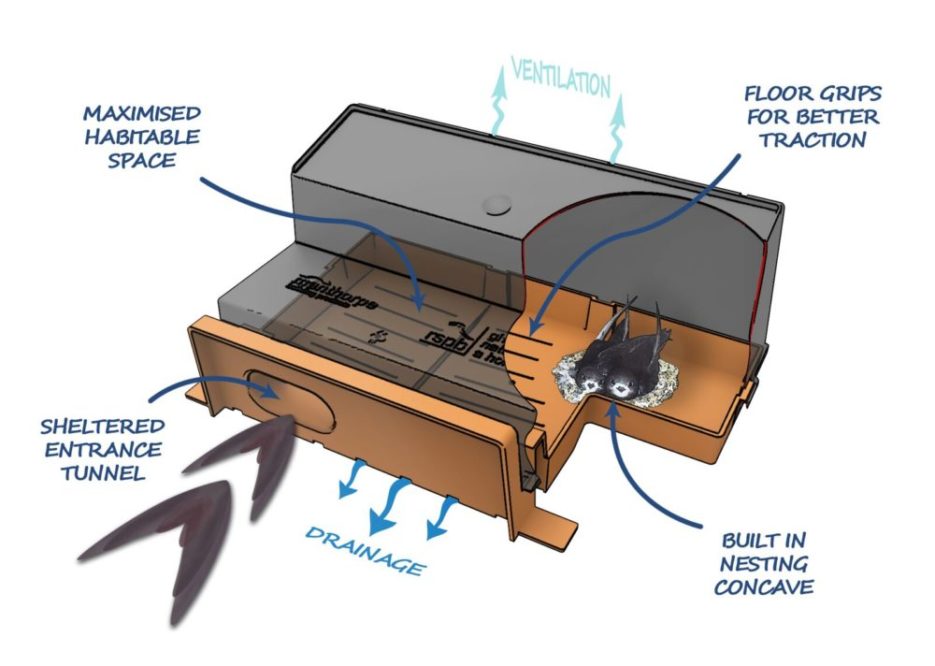Petition calling for swift bricks in all new buildings in Wales crosses 10,000 mark

Jon Gower
At this time of year we mark the departure for Africa of a rapidly declining bird species that visits Wales for a very brief time each summer season.
When I first moved to Cardiff in the early 1990s the sound of a summer evening was that of screaming swifts, scything through the skies above my home in Canton.
There are still a few around, but nowadays there are precious few nesting sites in the area.
Largely the end of the day is no longer signalled by their screeching or by their scimitar-shaped wings slicing through the air. Yet they used to be sufficient a sight and sound as to instigate a poem on the subject:
Swifts, birds of summer
Startle Welsh sky on scythe-shaped wings,
Their sooty brown plumes all bakelite black at this distance
Harvesting high, wildly aloft above the rooftops,
They are celebrations of such days,
Uncorking velocity
Windriding,
Winnowing spaces so wide they are not spaces
On curved wings
That cut the plastic air.
Too few
Sadly this year I’ve only seen a couple of individual birds and that on just a few evenings, even though some do nest a couple of streets away.
The special swift tower, laudably erected by the RSPB on the Cardiff Bay Barrage, to tempt in nesting birds by playing recordings of swifts doesn’t seem to have worked that well, but there may simply be too few birds to attract.
These aren’t just our birds.
The swifts that visit Wales in summer spend the winter feeding over the great rivers of Cameroon and Central Africa, with some pressing on to countries such as Mozambique, which underlines the necessity that we play our part in an what is an international responsibility for their protection.

Fastest
Swifts are the fastest birds in level flight and can sleep, eat, drink and mate on the wing.
Their cries define Welsh summers. Sadly, they are rapidly declining – down 72% in the last 30 years.
Swifts nest in holes in buildings.
Renovation makes them homeless, and new-builds currently offer no cavities.
Without more nesting options, swifts will disappear. Incorporating swift bricks into all new developments would help swifts (and other struggling birds like house martins and sparrows) to recover.
Decline
British Trust for Ornithology data show Welsh swifts declined by 72% from 1995 – 2018. They are Red Listed as Birds of Conservation Concern.
Swifts face many challenges, but nest site loss is a major factor.
Due to the scale of Welsh decline and ongoing destruction of their unprotected nest sites, only a mandatory approach will provide enough new nest spaces to allow swifts to recover to anything like former levels. Regulatory or legislative change is needed for this.

Decline
In light of such precipitous decline a petition asking that swift boxes be installed in all new buildings in Wales has now crossed the all-important 10,000 mark, a move that was rejected in England, despite energetic campaigning by authors such as Hannah Bourne-Taylor.
View this post on Instagram
The Welsh petition underlines how:
‘Swift bricks are nest-boxes that can be built into a wall. They are BSI standardised, affordable, sustainable, easy to install, don’t need maintaining / replacing, and help other declining hole-nesting birds.
‘Swifts’ lives have been linked to ours for centuries. Their connection with buildings is captured in an old
Welsh name – gwrach yr eglwys (‘church sprite’).
Swifts are a charismatic species and enliven built up areas, inspiring people and communities. They depend on us – their disappearance would be a real loss.’
Gwrach yr eglwys is just one of the many Welsh names for the species, a fact that suggests they were formerly much more numerous and obvious in our skies.
Tim Birch, Senior Policy and Advocacy Manage for Wildlife Trusts Wales said: ‘In Wales swifts have declined by over 72% in the last 30 years and it is one the fastest declining birds in Wales.
“Swifts face many challenges from their long African migration to and from Wales, to finding enough insects to feed on.
“One of these challenges is finding suitable nest sites in buildings that they use. We can ensure nest sites for them in the future by making space for them.
“That is why we are calling on the Welsh Government, as a matter of urgency, to ensure swift bricks are included in all new-build developments in Wales.
“It’s a simple measure that would make a huge difference for our swifts. It would be tragic if we were to lose swifts in Wales. They need our help and it is urgent.”
Support our Nation today
For the price of a cup of coffee a month you can help us create an independent, not-for-profit, national news service for the people of Wales, by the people of Wales.





